Ever feel conflicted? Lexus apparently does.
The new GS looks more aggressive than the old GS, is tuned to feel more aggressive – and can be ordered with an overtly aggressive F Sport performance package (subject of this review) that includes 19 inch “summer” tires, an Adaptive Variable Suspension with high-rate coil springs and larger-diameter sway bars, massive 14-inch brake calipers up front, a body kit, heavily bolstered seats – and a bunch of other high-performance upgrades that weren’t even available in the previous GS.
But, the formerly optional V-8 is gone.
And max power is down to 306 hp – vs 342 before.
Was is los?
Lexus clearly wants the new GS to appeal more to sport-minded buyers – who, let’s face it, are not the traditional Lexus buyer. But Lexus, like every other car company, can only do so much in the current (and soon-to-be-here) environment. An environment as hostile to consumptive V-8 engines as America is becoming to privacy and individual rights. With Obama’s 35.5 MPG fuel efficiency fatwa just over the horizon, V-8s are on the endangered species list – even in high-end cars like this.
The question remains, though:
Is a six (and 306 hp) sufficient?
WHAT IT IS
The GS350 is Lexus’ mid-sized, mid-priced luxury-sport sedan.
It’s available in both RWD and AWD versions – with the RWD version starting at $47,250 and the AWD version starting at $49,800.
The formerly available V-8 powered GS460 has been dropped.
To make up for this, a new F-Sport performance package ($5,690) is available. It includes a 19×8 wheel/tire package, a more aggressive version of the adaptive suspension system with S+ mode, specially calibrated Variable Gear Ratio (VGRS) steering, “striated” aluminum interior trim plates and other interior/exterior upgrades. The F-Sport package also includes the Premium Package’s rain-sensing wipers, heated (and cooled) front seats and power rear sunshade.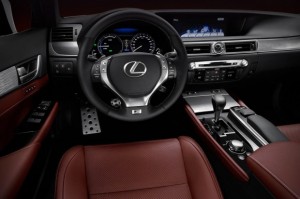
WHAT’S NEW
The 2013 GS has been heavily updated for the new model year – with more emphasis on performance (handling/responsiveness) if not all-out power and acceleration.
WHAT’S GOOD
Sixty more hp standard vs. price-equivalent (and four-cylinder powered) 2013 BMW 5-series.
About $4k less to start than comparably powerful/performing six-cylinder Benz E-Class and Audi A6 3.0T.
Much more engaging to throw into the curves than the previous GS.
F Package ups the high-performance ante with 19 inch wheels, cinched-tight suspension tuning and faster steering.
V-8 option – like the Prime Minister’s Prime Rib at Outback Steakhouse – has been taken off the menu.
Torque is way down 277 lbs.-ft now vs. 339 with the formerly optional V-8.
Hyundai Genesis R Spec with a 5 liter V-8 (and 429 hp) is available for less ($46,800).
A 333 hp Genesis V-6 (vs. 306 for the Lexus) lists for $34,200.
Seat heaters are lukewarmers when “ECO” mode is engaged.
UNDER THE HOOD
The ’13 GS – all versions, including the F Sport – comes standard with a 3.5 liter V-6, same size as last year but with the output increased slightly to 306 hp from 303 hp previously. Also increased slightly is the gas mileage – which now stands at 19 city, 28 highway for the RWD model vs. 19 city, 26 highway previously. Lexus is proud to tout that the AWD-equipped 2013 GS350 is now as fuel-efficient as last year’s RWD GS350 – posting the same 19 city, 26 highway stats as the old model.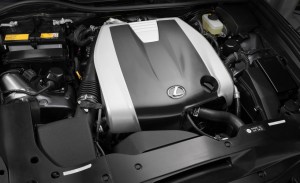
Part of the reason for the improved output – and mileage – is a new, more efficient direct gas injection system. The bigger part of the reason is that the new GS is lighter by about 150 pounds than the old GS: 3,795 lbs. vs. 3,945 lbs. (the GS460).
Also new is a multi-mode six-speed automatic transmission – which in addition to the predictable Sport, Normal and Snow settings also includes an ECO mode to eke out a few extra MPGs when you’re not feeling the need for speed.
Settings are controlled by rotating a knob on the center console – left for ECO (dash glows blue) right for Sport (dash glows red). Normal is the default setting. Push the rotary knob down to engage. There’s a smaller button for Snow mode behind the main controller knob.
In Sport mode, you’ll get firmer shift quality – including rev-matching downshifts and gear holding during hard cornering and so on.
In ECO, it’s the opposite: the transmission changes its shift parameters to maximize fuel economy. It tries to get you into top gear as soon as it can, to cut down the revs – to cut down the fuel usage. But, beware: ECO also wicks down the seat heaters (and AC). If you want warmth – or cold – turn ECO off.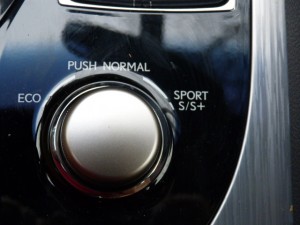
Normal mode is in between.
F-Sport equipped models get an additional setting – S+ – which also cinches down the Adaptive Variable Suspension to its firmest setting.
The transmission is similar in layout and function to the one found in the exotic IS-F sedan and is a very sophisticated gearbox, but one wonders – given the pressure to make cars more fuel efficient – why Lexus didn’t use the eight-speed transmission that came with the previously available V-8. The tighter gear spacing would – you’d think – result in better gas mileage, as well as better performance. Plus, there’s the image issue. Seven and eight speed transmissions are common in this price range.
A six-speed is so $30k… .
Quickness-wise, the ’13 GS350 V-6 almost matches the 0-60 run of the previous V-8 powered GS 460 – about 5.7 seconds (RWD version) vs. 5.4 seconds for the old GS 460.That’s the good news. The bad news – for Lexus – is the GS needs either more power or two more cylinders to match moves with competitors like the Hyundai Genesis and BMW 5, both of which still do offer a V-8 option. And also to deal with more potent V-6 competitors like the Infiniti G37. That one’s available with a 328 hp V-6 and AWD for just $38,950. Without AWD, the G37’s MSRP of $37,350 is almost exactly $10,000 less than the base price of the RWD, 306 hp GS350.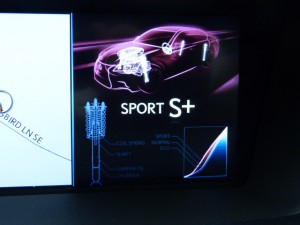 And let me tell you, the G37 is a damn nice car.
And let me tell you, the G37 is a damn nice car.
Lexus does have a hybrid version of the new GS on deck for later this year or early 2014 – which will (reportedly) match the power/performance of the old V-8 GS460 – while delivering 31 MPG combined.
But don’t expect that to come cheap.
ON THE ROAD
The immediately noticeable functional difference, last year vs. this year, is handling and ride.
When you want it to be.
In Normal mode, the new GS is as plush as the previous GS. Even with the F Sport equipment and the super aggressive Dunlop Sport Maxx wheel/tire package – which is not only “summer” and 19 inches, but staggered: different sizes, front-rear (fronts are 235/40-19, the rears are 265/35-19).
These are track-day tires – but the ride quality is not.
Until you rotate the knob on the center console, that is. Choose Sport – or better yet, Sport plus – and you’re ready to tango with BMWs. The traction/stability control system does come on pre-emptively early if you don’t turn it off (all the way off; more on that below) but that small issue aside, the reflexes and grip threshold of the F Sport GS will not disappoint you. 
The gear-holding (and throttle-blipping) six-speed automatic has a learning algorithm that monitors your driving; the more you step it up, the more aggressively it shifts. The F Sport upgrades have made the GS much more competitive as a luxury-sport sedan vis-a-vis models like the standard-bearing BMW 5. Especially when you factor in what’s under the hood for the money. The $47,250 GS350 has 66 more hp than the four-cylinder-powered (240 hp) $47,800 BMW 528i.
That 66 hp advantage means faster corner exits – and almost a full second quicker, zero to 60 – for the same price.
The new GS is also a lot more lively than the current Benz E350 – which has about the same hp (302 hp) but is set up more like the old GS, in terms of being more of a cruiser than a bruiser.
In my opinion, the greatest threat to all the Name Brand luxury-sport sedans in this segment is the almost-unbelievable Hyundai Genesis. The V-6 version is at least as strong as the base-engined versions of all these models for much less money – and considerably stronger than several, including the four-cylinder versions of the Audi A6 and BMW 5. And the Hyundai’s optional 429 hp V-8 dominates them all on a price-anywhere-near equivalent basis. The V-8 powered BMW 5 (the 550i) and the V-8 powered Benz E (the E550) cost some $20,000 more than the V-8 Genesis – and still come up some 20 hp shy of what the Hyundai delivers.
Benz and BMW are probably on their knees praying that CAFE kills the Genesis V-8!
AT THE CURB
Americans are, uh, bigger than they used to be – and one of the obvious downsides of a sporty car, if you’re not-so-sporty yourself, is it’s also usually a tighter-fitting car.
Not so much on the outside – the overall exterior proportions of the 2013 are about the same as before: 190.7 inches end to end vs. 190 even, previously.
But inside, there’s a bit more front seat headroom (38 inches now vs. 37.8 before), backseat legroom (36.8 inches vs. 36.4 inches) and – the big one – noticeably more shoulder, or side-to-side room: 57.3 inches up front and 55.7 inches in the second row vs. 56.3 inches up front and 55.1 inches in the second row previously.
Wider-load Americans will appreciate the extra spreading-out space.
Styling-wise, the ’13 has edges where the old model had curves. The front clip, especially. It has an angular chin with inward-canted grille openings that might have been inspired by the menacing mug of a Cylon centurion from Battlestar Galactica. No insult intended – it looks angry and mean, like a Cylon Centurion. A red cyclops eye doing the back-and-forth inside the grille is all that’s needed to complete the effect.
By your command…
But – as a Lexus ought to be – the overall package is still pretty low-profile. The GS doesn’t call as much attention to itself as something along the lines of a Jaguar XF – or even the Infiniti G – which is a quality current Lexus buyers seem to desire.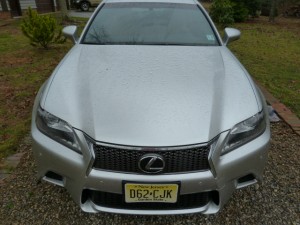
The Lexus mouse controller is – in my opinion, having tried them all – the best in the business. The design is (for once) ergonomic. There’s a padded palm rest on the console, with the mouse right at your fingertips. Up or down, left or right – then push to select what you want. There’s just enough drag to give you precise control of the pointer, even when the car is moving.
Ease of use is further improved by the oversized (and recessed, to cut down on sun glare) 12.3 inch LCD display for the GPS and infotainment. It’s easy to see – and read.
As a rulke, I am not a big fan of electronic bedazzlers – because they bedazzle the driver and take way from the act of driving the car. Not in this case, though. For once, the technology helps you operate the car’s system’s more effectively – less awkwardly – which means you’re more able to effectively drive the car.
A lengthy suit of high-tech options is available – everything from a heads-up display (HUD) to military-style infrared night vision to automatic self-parking. There is also Lexus’ Enform concierge technology, which works with and through your Smartphone.
It may no longer have a V-8, but that doesn’t mean the GS can’t hustle.
The V-6 approximates the straight-line performance of the previously optional V-8 and gets better mileage doing it. However… .
It’s still not a V-8. And a V-8 has cachet – not just two more cylinders. It’s what separates the proverbial men from the boys.
Don’t misunderstand me: The F Sport GS is a credible performer – and it has a lot to offer. But with a 380-ish hp V-8 under its hood, it would offer a lot more.
Some small stuff:
The GS350’s traction/stability control is pretty peremptorily nannyish. You’re not allowed to turn it off while you’re moving. Or rather, it will turn itself back on as soon as the car reaches about 30 MPH – whether you want it on or not.
To turn the traction/stability control off – and keep it off – you have to stop the car first. Then you have to press – and hold – the button. Only then is it finally off – and only then will it remain off.
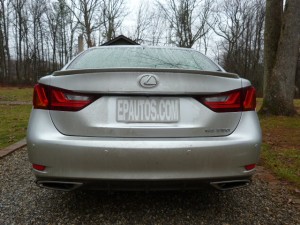 This is – ostensibly – a driver-minded car. So the driver’s mind – not a computer nanny’s mind – ought to be in charge of the TCS.
This is – ostensibly – a driver-minded car. So the driver’s mind – not a computer nanny’s mind – ought to be in charge of the TCS.
THE BOTTOM LINE
All that’s really missing is two more cylinders. But don’t blame Lexus.
Thank Uncle.
Throw it in the Woods?



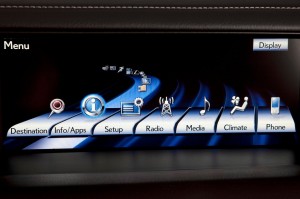









I loved the car on the test drive. (present car bmw550) The only thing I wanted more of was low end torque. There has to be a way to either add a turbo or re-tune for another 40 ft lbs……
Agreed –
The old V-8 provided much more torque and got the car going with more authority. I doubt that tuning (alone) would result in upping the torque output of the V-6 by 40 ft/-lbs. A turbo would do it, but that gets into money. To do it right, especially. I’m guessing in the neighborhood of $5k for a well-engineered kit with all the necessary peripherals, installed properly, etc.
The real villain here is … the government. It’s the 35.5 CAFE mandate that’s slowly killing off V-8s… and soon, V-6s, too.
Couldn’t a turbocharger turn that somewhat run-of-the-mill V6 into a respectable power house?
Absolutely –
But it appears it’ll have to be an aftermarket turbo. The CAFE crush is upon us – and its effects are becoming obvious even in the formerly immune inner sanctum of higher-end cars.
That would be the day that I buy something with a phoney Sport decal/name and then get under the hood to install a turbo thing….Lexus didn’t get it right, plain and simple!
I agree – but in defense of Lexus, they’ve had to cut back (engine size/power) to placate the federal government … as opposed to, you know, the people who buy the damn cars. This is a trend that’s becoming very obvious. A cursory look at 2013-2014 stuff clearly shows a trend toward smaller engines and less power.
In the case of the GS, Lexus could have killed two birds with one stone by finding a way to drop 400 pounds off the curb weight – and perhaps offer a six-speed manual transmission. That would have put the “sport” in F Sport!
Considering that the GS350 is for “Lexus” buyers, the omission of the V-8, and the “only” 6 speed transmission are probably not deal killers. On the other hand, I can’t imagine many Lexus buyers wanting to pony up for the F Sport handling package. Such high performance handling in a car with a lower performance drive train seem out of balance….unnecessary…..almost inappropriate.
It is weird – disjunctive – isn’t it?
They make the car more aggressive in every way… except under the hood!